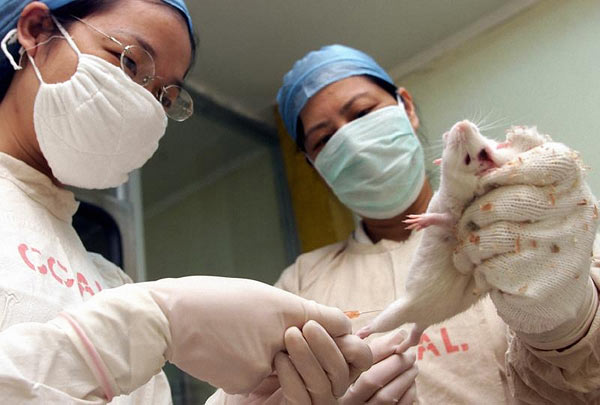Society
Euthanasia promoted for laboratory animals
By Zhang Yuchen (China Daily)
Updated: 2010-09-09 08:16
 |
Large Medium Small |
Guangzhou - Guangdong province will begin to legalize and enforce the use of euthanasia on laboratory animals starting Oct 1.
According to the new regulations, lab animals will be euthanized when lab staff put them to death, the Guangdong science and technology department said in a press conference on Tuesday.
|
 Lab staff experiment on a rat in Guangdong province in this file photo. [Provided to China Daily] |
It is the first time the authority has officially promoted euthanizing lab animals.
The regulation also aims to protect experimental animals' welfare and stipulate a more humane process of experimenting on the animals. It calls for more care of the animals and their mental and physical health.
| ||||
"Laboratory animals are suffering substitutes for human beings, but many labs in Guangdong didn't treat these animals well," said Huang Ren, head of the institute.
The upcoming regulation emphasizes good care for the animals and mercy killing.
"We strictly control every aspect of the animals' living space: temperature, humidity and even the air flow speed inside," said Huang Bing, deputy director of Zhongshan Ophthalmic Center of Sun Yat-Sen University.
"They (monkeys used for experiments) all eat three nutritious meals per day."
Besides good food and pampered care, Huang added that staff in the center make sure the monkeys are in a good mood "so that they want to cooperate with the experiment."
"Sometimes, we play soft music to make them happier."
Scientists like Huang believe animals have the right to enjoy five kinds of "freedom" - sufficient food and water, a state of well-being, no pain, no fear or sorrow, and liberty to express their nature.
But, in the process of experimenting on the animals, the five rights cannot be fully realized.
The international community now agrees with the 3-R principle in regards to lab animals: Replacement (using lower-level animals to replace senior-level ones), reduction (reducing the number of lab animals used), and refinement (bettering animals' living conditions).
In 2009, Guangdong completed nearly 200,000 experiments involving the use of lab animals to support over 1,000 scientific projects for the province's 92 billion yuan ($13.5 billion) pharmaceutical industry, according to the Guangdong science and technology department.
China published its first lab animal regulation in 1988, which has been under revision since 2000.
He Zhengming, one of the revisers of the regulation, told Southern Metropolis Weekly that the revised regulation will encourage the use of other objects to replace lab animals.
But Liu Enqi, director of the laboratory animal center at the College of Medicine, Xi'an Jiaotong University, said experimental animals cannot be entirely replaced.
Liu, who sets up monuments for the lab animals before every experiment, was quoted by Southern Metropolis Weekly saying "No lab animal, no biomedical research".
"What we can do is just try to reduce the unnecessary or excessive use of lab animals," he said. "At least we (human beings and animals) share the same feeling of pain."



